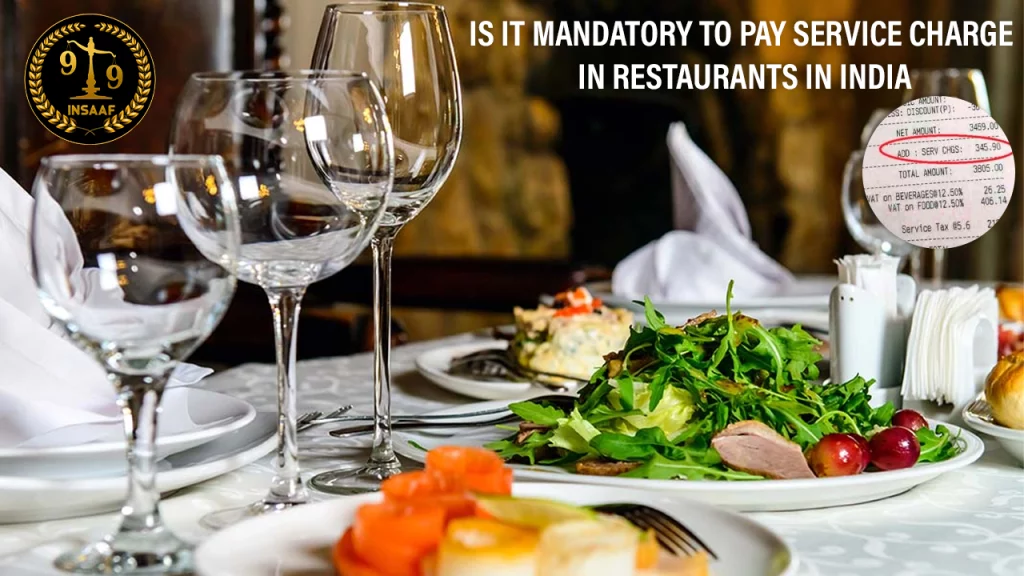

Online Legal Advice from Insaaf99® Online Lawyer Consultation in India


Online Legal Advice from Insaaf99® Online Lawyer Consultation in India

Introduction Service Charges in Indian Restaurants
Service charges in Indian restaurants have been a source of debate and controversy for a long time. These charges, which are intended to compensate restaurant staff for their services, often lead to perplexing questions about their legal intricacies and operational nuances. Let us take a deep dive in studying the complexity of service charge in Restaurants in Indian restaurants, including the legal framework that governs them.
Service charges are additional fees imposed by restaurants, usually a percentage of the total bill, to compensate the staff for their services. It's important to note that service charge in Restaurants are distinct from tips, which are voluntary and at the discretion of the customer.
In July 2022, the Central Consumer Protection Authority (CCPA) released directives emphasizing the voluntary and discretionary nature of service charge in Restaurants. Consequently, restaurants are prohibited from compelling customers to settle service charges, granting customers the liberty to decline payment if they so choose.
You are a customer at a restaurant in India. You have just finished your meal, and the bill is presented to you. You notice that there is a service charge of 10% added to it. You are surprised, because you know that service charge in Restaurants is not mandatory in India. You ask the waiter why the service charge is there, and he says that it is a standard charge that all restaurants in India levy.
You explain to the waiter that you are aware of the Central Consumer Protection Authority guidelines, and that you do not believe that service charge in Restaurants is mandatory. You ask him to remove the service charge from the bill. The waiter is reluctant to do this, but he eventually agrees. He says that he will have to speak to the manager. The manager comes over and asks you about the service charge. You explain the situation to him, and he says that he will remove the service charge from the bill.
The bill is then presented to you again, without the service charge. You pay the bill and leave the restaurant. You are glad that you stood up for your rights as a consumer. You also feel that the restaurant was fair in removing the service charge in Restaurants after you explained the situation to them.

The guidelines set by the CCPA underscore the imperative for restaurants to provide explicit notice to customers regarding the voluntary nature of service charges. This mandates that service charges must be distinctly reflected on the bill, with no automatic or default inclusion.
Should a restaurant impose service charges without the requisite transparency, or in the event a customer chooses not to pay this charge, the establishment is precluded from withholding service or denying entry to the customer.
These CCPA directives have garnered approval from consumers who have vocally contested that service charges resemble to hidden charges. The guidelines have sparked a legal battle, with the National Restaurant Association of India (NRAI) filing a petition in the Delhi High Court to suspend their implementation.
The National Restaurant Association of India (NRAI) asserts that service charges are a means for restaurants to compensate their hardworking employees. Additionally, they argue that the guidelines of the Consumer Protection Act (CCPA) could lead to job losses in the restaurant industry.
The Delhi High Court has yet to issue a judgment regarding the NRAI's petition. During this interim period, consumers are encouraged to remain informed about their legal entitlements and, should they find it dissatisfactory, to exercise their right to decline payment of the service charge.
Service charge is not mandatory in India. Customers should be aware of their rights and should not be afraid to refuse to pay service charge if they are not happy with it. Restaurants are usually willing to remove the service charge if the customer explains the situation to them. Customers should be polite and assertive when refusing to pay service charge. They can also file a complaint with the CCPA if they are refused service or denied entry to a restaurant because they refuse to pay service charge.
Insaaf99 is your online legal consultation partner, ready to assist with matters like service charge disputes in Indian restaurants. Our seasoned legal experts offer expert guidance, ensuring you understand your rights and the ever-changing legal landscape. We provide personalized advice, stay updated on legal developments, and can aid in document preparation. Insaaf99 empowers you to make informed decisions and protect your rights effectively.